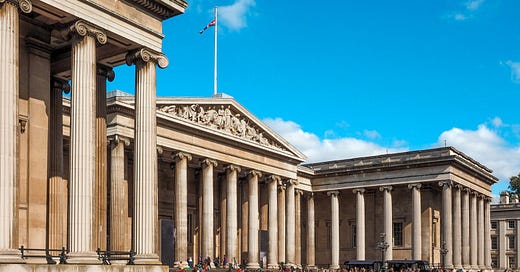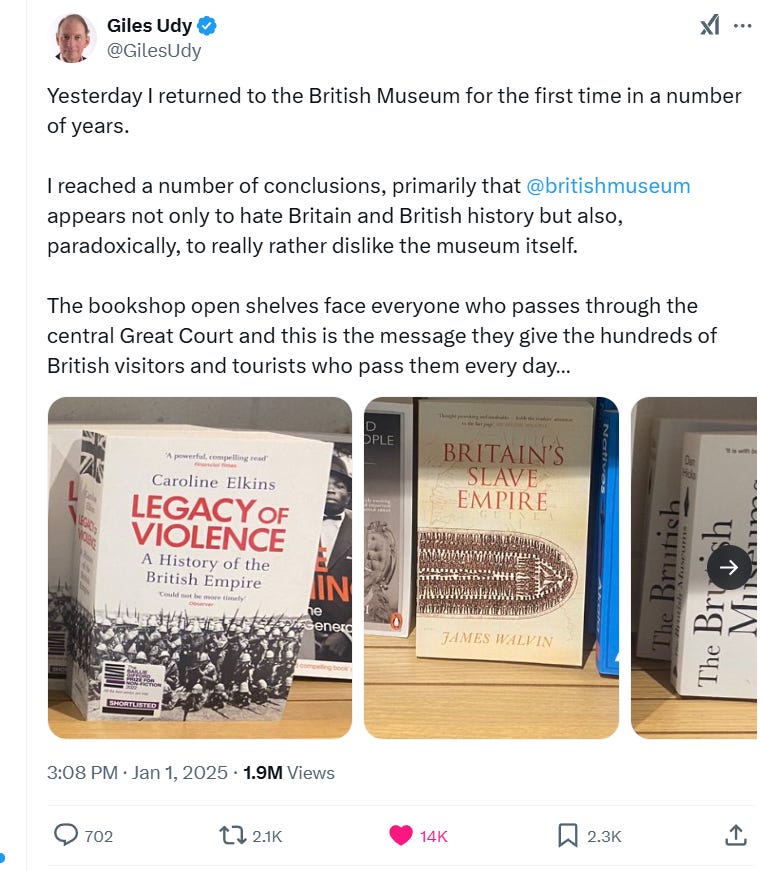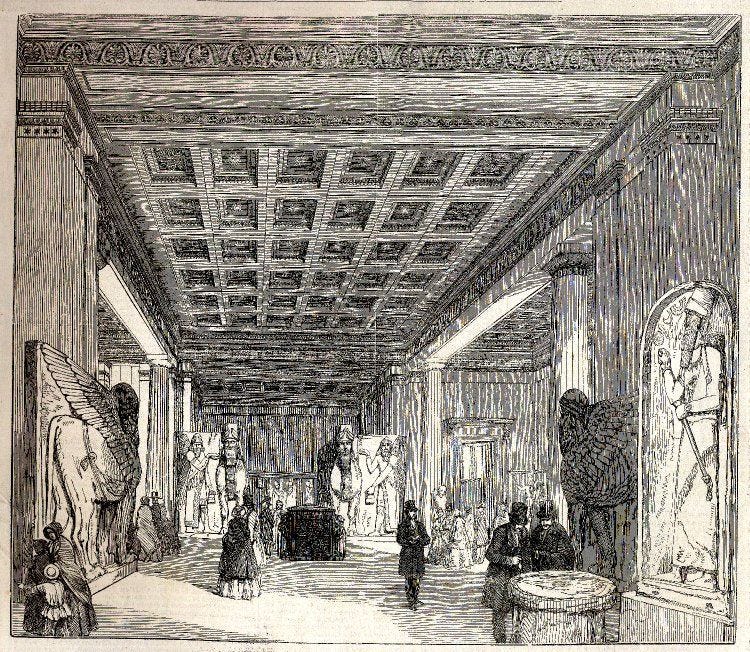The Cacophony of Western Guilt
The British Museum, Conservation, and the Noose of Imperial Penance
Museums have become a window into the ideological crisis of our time.
Museums are places you go to in order to learn about, and to some extent experience, the force that is “history”. You get to see incredible items up close to which many people throughout history would never have had such access.
But as you visit historic museums in recent years, you can see a new kind of history “on display”. It is not the one they are necessarily intending to display, it is what lies behind it all. Quite simply, the West—like many civilizations in decline—has all but given up on itself. As a civilization, we no longer believe in that which got us where we are. We live in a kind of perpetual regret—or enforced penance—eager to undermine the very things which cause us to go to museums in the first place.
Visiting the British Museum today, for instance, is an exhibit in itself. It tells you things about the nature of the culture that built and envisioned such a museum, whilst also showing you what is now happening to that culture before your eyes. The true power is no longer in the artefacts themselves, but in the plaques that “explain” them, and the books sold in the gift shop which undermine the very concept of the museum itself.
The historian Giles Udy noticed something similar and recently posted about it on Twitter, noting that the museum appears now to dislike itself. The post gained almost two million views and clearly resonated with many people who no doubt see the same trend.
I have often sensed the same tragi-comic feeling when visiting that museum, and have seen similar things in the Smithsonian Museum of American History. Much of modern Britain and America is now a multicultural hologram of its former self. These institutions propagate the absurd lie that you should feel proud about not feeling proud about your national or cultural heritage, and then ask you to kindly donate to the cause.
The Power of the Plaque
In these great museums—chock-full of phenomenal discoveries and stories of greatness and brilliance in the history of our culture—it seems that every time you see an exhibit that might make you feel slightly proud of something your cultural forefathers did, some “insightful” plaque is never too far away. Such plaques bears the now-familiar self-loathing desire to remind you at every possible interval—often through a severely distorted lens—that such forefathers were all rather terrible, actually.
Thus, according to the insightful plaques—the true “curators” of the modern museum—even the very exhibit you were feeling proud about was itself part of the Great Evil which your forefathers all stood for at all times, in everything they built, discovered, and treasured. The implication is that you really shouldn't even be thinking of this exhibit as "good" at all, and shame on you for ever thinking that it was; in fact, shame on you for coming to the museum at all...but please don’t forget to leave that donation on your way out. Or how else will the museum continue in its noble mission of destroying the very reason for existence in future?
The power of the plaque functions in a remarkably similar way as plaque does upon teeth. It causes and accelerates decay, disabling the use of one’s teeth in any future encounter in which such teeth may have been needed to defend oneself.
American Shame
As I observed of the Smithsonian in Washington last year:
"Wandering through the Smithsonian Museum of American History, it struck me how truly astonishing it is to think of the history of America, of all it stood for, all it has achieved in the world; all the risks, the convictions, the courage, the enterprise, the ambition, the sheer audacity to overcome challenges that seemed insurmountable.
Even with all the negative byproducts of such enterprise in the onset of modernity, there is an overwhelming amount of good things to appreciate in America’s legacy. And yet, walking around the various exhibits, it seemed obvious that much of this is now tainted with self-invoked shame.
Every third paragraph I read seemed to be a reminder about the horrors of slavery, or the duplicitousness of segregation and capitalist greed, often in sections of exhibits where you really wouldn’t expect such a comment to be made.
Rather than having specialised exhibits for raising awareness about the darker side of their national history, it seems to have been preferred that these issues are allowed to work their way into everything, so that it becomes effectively impossible to learn about any one aspect of American history without thinking about these contradictory downsides at every turn.
“Exactly!” say the critical theorists, “that’s just how it should be!” It’s as though such evils (very bad though they were) truly undermined anything and everything else you might have thought was “good” about America. I wonder how many Americans of this present generation know they are being systemically indoctrinated to be ashamed of their past.
Indeed, arguably there seems to be a desire to inculcate in the younger generations a fundamental estrangement from their forebears. It’s as though it would be a more virtuous thing for these great grandchildren to exhibit profound disloyalty to their ancestors, these pioneers who likely worked with blood, sweat, and tears to help build the prosperous modern America which this present generation inherited without lifting a finger.
As in Britain, all are now taught to see what they have inherited from the past through a fundamentally warped lens: the land stolen, the natives cruelly murdered, foreign immigrants maligned, non-whites enslaved, gay people persecuted, poor people further impoverished, rich people further enriched, etc.
In the midst of the beautiful surrounding buildings, the national history and national pride - not least all that Christianity had to do with it - it seemed a strange thing indeed to think of all this as something America ought not to have - that is, if the new prevailing narrative is to be believed."
The Nature of Conservation
The condescension one is subjected to by the new cultural emperors of our time really does feel like sitting under one long, never-ending lecture which leads to the same conclusion every time. Nowhere is this absurdity more present than in the history of archaeological discovery, at which 19th century Britain was especially successful. The ungrateful modern inheritors of our culture now see such efforts at collecting and conserving historical artefacts as mere colonial theft.
But is it theft? Is it as simple as saying that European nations went and stole precious artefacts that were sitting around? It's hard to imagine 19th century Iraqi-equivalents, for example, having the vision, knowledge, resources, infrastructure, and sheer will, to set out to discover and carefully excavate the ancient city of Ninevah. They didn't. Europeans did. And it wasn't easy. And we shouldn't be ashamed of that. It is, in fact, something that has been good for civilization as a whole, including the civilisations whose history is better preserved as a result.
You can learn about the travails and discoveries of Sir Austen Henry Layard in uncovering the remains of Ninevah, even in the British Museum, even amidst the cacophonous plaques that undermine the entire epoch in which he worked.
The great irony in all this is that it is our own history that is not being preserved. It is this history which Giles Udy was noticing is now being distorted within the very institutions that were set up to conserve it.
Whatever you think about the motivations of the former imperial powers, you can't escape the fact that much of what we appreciate about history today would not have been possible without their efforts and vision. We simply wouldn't have had access to such history, and would not have had the will to even try. It’s also hard to imagine an ideologically compromised culture like our present one being capable of such feats today. They might think of them as too “immoral” to try.
The very act of "conserving" artefacts of history is itself a reflection of a civilisation's ethos. Even the Woke imposters informing the modern ways of the British Museum at the highest or lowest levels today still cannot help but continue to portray a vision of the preservation of culture which remains technically “foreign” to how they—as modern ideological barbarians intent on undermining historic virtues—have been taught to think.
The Story We Tell
The British Museum is a living testament of historical artefacts which tell a story. This story is not actually the one in the bookshops about a great nation "plundering" the world of its treasures, but a of a great nation "treasuring" the treasures that may not otherwise have been treasured.
Contrary to the allegations that this acts as a way to despise other cultures, it actually helps to celebrate what is good in other cultures and helps to tell their own story, which they might not have otherwise told themselves. It does this whilst also celebrating its own culture—the culture that sought out the wisdom and skills needed to find and preserve those artefacts and stories.
Those who did such things, whose glorious discoveries we still enjoy to this day, would not have been embarrassed at what they were doing. They would have been more embarrassed at how our own generation arrogantly tramples upon what was bequeathed to them. They would have gasped at the way we have become permanently drunk on egalitarianism and thus we cannot understand that it is possible for one particular culture to excel above any other.
"It is the glory of God to conceal things, but the glory of kings is to search things out." (Prov. 25:2).
The cultural Marxism which has infiltrated western culture at almost every level cannot abide this concept, because it rejects outright the very idea that there should ever have been such things as kings or glory, let alone “God” above it all.
To be aware of this problem is not to give colonialism a blank slate, nor a blank cheque. We have had plenty of opportunity for such critiques. But they have not only gone far too far today but have become the perpetual noose in the hands of the cultural Marxist lest anybody get any ideas about recovering any such vision that deviates from their own deconstructive forms of colonialism.
To some, all this talk of conservation and museums and heritage and history may not seem to some to be all that big a deal in the grand scheme of things, least of all for Christians to care all that much about. But it is this very instinct that helps fund the continuing undermining of the legacy and morality of Christendom in our time. We allow this to keep happening at our peril, and the peril of many others.







Very good article Aaron!
Being an Indian who has grown up hearing that British stole our precious cultural artefacts and plundered us and then realising the good they have done to our country by uniting the fighting, fragmented kings under one banner, laying the foundation of one of the world’s largest railway network, creating a framework for the bureaucratic system etc., i can resonate with this article.
I am grateful for all that British did inadvertently to my country and for the western influence in our governance and landscape it has brought.
Obviously, the Christian education and cultural reform ushered in by the missionaries who came during the Colonial reign has made us pagans open our eyes to the Light of the world and confess our sins to submit to the Lord Jesus.
God has been kind to our nation through His providential hand through the British occupation. Even with the exploitation and unjust ways of ruling India, British did more good than bad.
Their exploits even with self serving intends sometimes were as John Piper would call it “spectacular sins” paving the way to bring us to faith in God and transformation of a pantheistic society to influences which we would have never had otherwise.